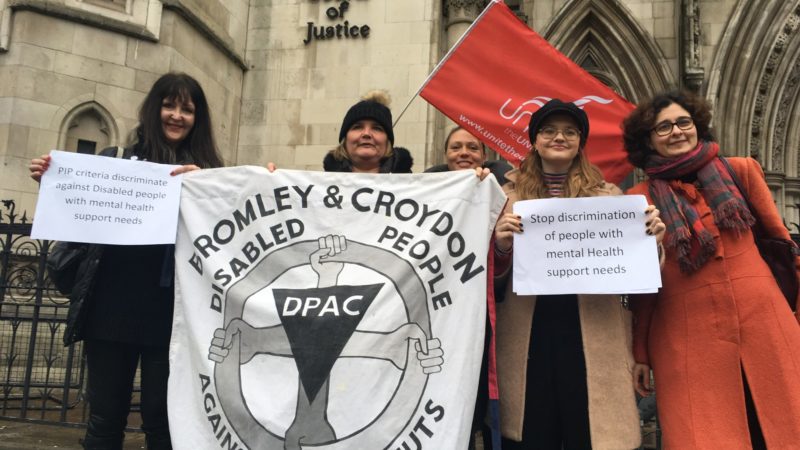164,000 people living with mental illness will now receive the benefits they were entitled to all along.

A change the Tories made to Personal Independence Payment (PIP) that cut 164,000 people’s benefits was unlawful, a high court judge ruled today.
The change in the spring made many people with mental health difficulties ineligible for a mobility support allowance that people with physical disabilities continued to receive.
But one woman affected, identified only as RF, took work and pensions secretary David Gauke to court over the cut.
RF said that the change meant she could no longer access the support she needed to travel, which had a severe impact on her ‘ability to participate in society and her independence’.
Her solicitor Sara Lomri, from the Public Law Project (PLP), told Disability News Service last month:
“My client does not understand why people with mental health problems are being singled out and excluded from a benefit which is supposed to help them.”
The PLP argued on RF’s behalf that the rule breached Article 14 of the European Convention on Human Rights because it constitutes “unjustified discrimination” by differentiating between mental conditions, such as social phobia or anxiety, and a physical disability.
Justice Mostyn agreed today, saying today:
“The 2017 regulations introduced criteria… which were blatantly discriminatory against those with mental health impairments and which cannot be objectively justified.”
Campaign groups hailed the ruling as a massive victory.
Tracey Lazard, CEO of Inclusion London said:
“This is a hugely important case. It challenges the discriminatory way the government treats Disabled people with mental health support needs. The outcome can make a difference to thousands upon thousands of Disabled people.
“We have always believed that these changes are discriminatory and unfair and should have never been introduced.”
But Lazard said it was alarming that going to court was necessary to challenge discrimination against disabled people.
She said:
“The government’s actions to change PIP regulations and single out people who cannot travel because of psychological distress are a brutal attack on the rights of Disabled people.
“Today’s case illustrates the lack of concern for Disabled people and the government’s inability to listen to us and engage with us.
“It is extremely worrying that many of us feel the legal action is the only way for us to get heard.”
Linda Burnip, co-founder of Disabled People Against Cuts agreed. She said:
“We are pleased with the judgement today. It will make a huge difference for thousands of Disabled people with mental health support needs.
[But] we have to remember that this challenge is taken in a context when the UN Committee on the Rights of Persons with Disabilities found systematic and grave violations of Disabled people’s rights a year ago.”
The Tories hoped to save £3.2 billion by 2022 with the change, but now they face having to pay compensation to those affected.
Responding to news of the ruling, Green Party Co-Leader Jonathan Bartley said:
“The courts have ruled that the Government’s actions were discriminatory and unlawful. The Government should now compensate all those who have been adversely affected and suffered hardship.
“Disabled people shouldn’t have to go to the courts to win basic rights which should already be theirs.”
A DWP spokeswoman claimed PIP replaced a system that was “less generous for people with mental health conditions and is designed to consider the broader picture of how someone’s life is affected by their disability or health condition”.
She said the department was disappointed with the judgement and will now appeal the verdict.
Charlotte England is a freelance journalist and writer at Left Foot Forward. Follow her on Twitter.
Left Foot Forward doesn't have the backing of big business or billionaires. We rely on the kind and generous support of ordinary people like you.
You can support hard-hitting journalism that holds the right to account, provides a forum for debate among progressives, and covers the stories the rest of the media ignore. Donate today.



